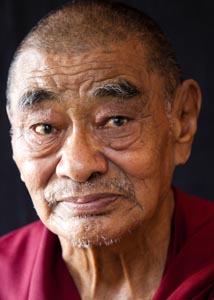Name: Ngawang Soepa
(Alias: Yes)
Gender: Male
Interview Age: 80
Date of Birth: 1933
Birthplace: Khyakta, Utsang, Tibet
Year Left Tibet: 1959
Profession: Monk
Monk/Nun: Currently
Political Prisoner: No

Interview No.: 21B
Date: 2014-01-03
Language: Tibetan
Location: Lugsung Samdupling Settlement, Bylakuppe, Karnataka, India
Categories: Culture and History
Keywords: childhood memories, Chinese -- first appearance of, environment/wildlife, escape experiences, March 10th Uprising, monastic life, nomadic life, salt trade, trade, Utsang
Summary:
Ngawang Soepa was born in Khyakta and was the eldest child of a nomadic family. He gives a detailed account of the process of gathering salt, which his family did in the spring and summer. They used yaks to transport bags of salt which were then bartered for grains from the farmers. Salt was mainly used to improve the health of the yaks. Ngawang Soepa also gives an account of bitho that is gathered from frozen lakes and bartered for grains. Bitho is described as a substance used in the preparation of tea to bring out its rich color.
Ngawang Soepa wished to become a monk, like his uncles. He was induction into the Sera Monastery and describes the activities of the monks in the monastery. He talks about seeing the Chinese for the first time--mainly young men with limited weapons. Then they gradually settled in the Tibet and transported cannons in trucks.
Ngawang Soepa witnessed the Chinese attack on Lhasa and Sera Monastery. He narrates the circumstances that led him to flee Sera Monastery back to his village and fear of the Chinese once again forced him to flee to India. He recounts life in Buxar, Inda where monks of all sects of Tibetan Buddhism studied the scriptures.
Interview Team:
- Marcella Adamski (Interviewer)
- Tenzin Yangchen (Interpreter)
- Pema Tashi (Videographer)

